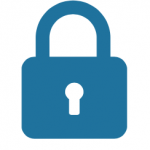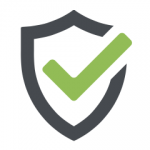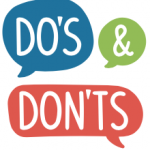When Working from Home
When working remotely, it’s important to stick to the same cyber safety guidelines as though you were in the office. With the FBI reporting an uptick in cybercrime related to coronavirus,1 it’s important to stay vigilant while connected at home.
 Use Strong Passwords
Use Strong Passwords
Passwords for WiFi and work accounts should be unique and tough to crack. Start with a special phrase that is at least 12 characters. Incorporate uppercase and lowercase letters, numbers, and special characters. Avoid including personal information, and don’t use the same password for everything.
 Updates Matter
Updates Matter
Install the latest updates for all devices, programs, and apps, which typically include improved security measures. Where possible, opt for automatic updates.
 Double Up on Security
Double Up on Security
Multi-factor authentication gives your work accounts an extra layer of security. This feature requires you to confirm your identity by way of another device when logging in somewhere new. Also, consider requiring a password for online video conference calls.
 Consider a VPN
Consider a VPN
If your company does not use a Virtual Private Network (VPN), consider investing in your own. This software secures your network to reduce your risk of a hack. Popular services include NordVPN and ExpressVPN.
Watch Out for Fake Emails!!!
Hackers often target individuals first with personalized fake emails or phishing emails. Before you act:
Review the Sender’s Email Address:
It may look like a message from your bank or a colleague, but a misspelled or incorrect email address indicates it’s fake.
Hover, Not Click:
Place your cursor over the link to read the URL. An unrecognizable site is a big red flag, so don’t click it.
Check the Tone:
Urgent, fearful messages requiring immediate action and a deadline are typically fake — even if they look like they’re from a co-worker.
Report It:
Notify your IT department immediately of the message following company protocol.

Keeping Your Kids Safe Online
With schools moving to virtual learning and limits on outdoor activities, kids are spending a lot more time online. Here are some tips to help make sure they use their devices safely.
 Know What Your Kid Are Up To
Know What Your Kid Are Up To
Understand your kids’ Internet habits. Know what sites they visit for school and for fun, and talk to them if you see something unusual.
 PRO-TIP:
PRO-TIP:
For the little ones, try installing YouTube Kids instead of normal YouTube on their devices.
 Block Dangerous Websites
Block Dangerous Websites
Talk to your Internet provider if you want to block certain websites from your network.
 Set the Ground Rules
Set the Ground Rules
Consider asking your kids to stay nearby when they’re using their devices and setting rules for what sites they can visit and when — i.e. YouTube allowed after school hours only.
Have a Conversation with Your Kids
- Outline the rules and set expectations for responsible online behavior.
- Educate kids on cyber safety so they understand for themselves the risks of unfamiliar websites, mysterious downloads, and conversations with strangers on the web.
- Share tips on creating strong passwords, protecting personal information, and using social media safely — especially relevant for teens and tweens.
Download a pdf of this article: Cyber Security PDF 8-9-21
Concerned about privacy online? Click here for an excellent article on The Social Dilemma – 10 Ways to Improve Your Privacy Online.
FOOTNOTES
© 2020 Buffini & Company. All Rights Reserved. Used by Permission. RMMK APRIL BONUS C
1. FBI, “FBI Sees Rise in Fraud Schemes Related to the Coronavirus (COVID-19) Pandemic,” March 20, 2020. 2. AVG Survey, 2018




